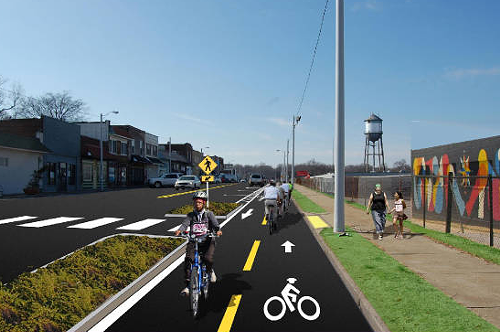
In a recent Flyer column, Wendi C. Thomas posed a question that demands an honest and sincere answer. Her question is relevant to all Memphians, and to all residents of Shelby County, Desoto County, Greene County, and any other place in the U.S., or in the wider world, where people of different races and cultures must live and work together. She asks: “How will biking be different from the other well-intentioned movements that still leave brown and black people and poor people behind?”
While her question was framed in the context of the economic impact of bike lanes on disadvantaged brown and black Memphians, the underlying problem behind her interrogative will come up again and again for as long as the world turns: How will we all make public policy together that doesn’t leave someone behind? This isn’t some random local issue that we Memphians alone have to deal with when we’re worrying about bike lanes, of all things. This is a fundamental problem within democracy itself, and woe to us all if we ignore it.
Nobody likes talking about race, but there it is, staring us all right in the face every day. Memphians, especially, must strive to reconcile the race issue for ourselves and for others, because we have the opportunity to do so. If we, of all communities, of all houses divided, can work out our differences and stand united afterward, we can become an example for the rest of the world to follow. The world desperately needs that kind of example, and we are uniquely poised to offer it. The stakes are higher for us than we might at first realize, because there are a lot of other people who don’t live in Memphis who will also be helped if we can we can get our own house in order.
Here is how we will not work out our differences: leveling the charge of “replicating racist systems” — essentially an accusation of racism — for supporting bike lanes. Firstly, if institutional racism is so pernicious that it can infiltrate the minds of staunch anti-racists when they endeavor to support a public project that has nothing whatsoever to do with race, then we all may as well drive home and go back to bed because there is no possible way to defeat an enemy that powerful. Moreover, even if the social theory behind that accusation describes reality with 100 percent accuracy, that is one of the single most depressing things you could possibly tell someone else: You were being racist without even meaning to. That message will win no elections and change no minds, because it immediately puts the listener on the defensive and tells them that they are not in control of their own thoughts and feelings. Nobody wants to hear that. Not even the Devil himself is believed to have that much power over the human will.
There is a movement afoot to make privileged Americans more aware of the largely invisible class, sex, gender, and race structures that undergird our society. Contemporary academics who study race and gender use a framework for understanding and mapping out those social dynamics called intersectionality. Among social scientists, intersectionality is used as a way to account for the fact that a single black mother of two in Binghampton might face a different set of challenges in life than an unmarried white male college graduate in Connecticut. In popular discussion or debate, it has become a way to bludgeon privileged individuals who are seen to be insufficiently devoted to the cause of social justice. If you’ve ever been told to “check your privilege,” you’ve already encountered it.
As long as this movement points an accusatory finger at the people it ostensibly aims to enlighten and tells them that they have no control over the problem, it is bound to fail. Race and class privilege are difficult enough concepts to understand and apprehend on their own, let alone when they are accompanied by a guilt trip. There are many more constructive ways to approach the problem, and while those privileges may very well permeate every aspect of our daily lives, the insistence that we shoehorn a discussion of race into absolutely every aspect of public policy decision-making is simply not practical. Sometimes a bike lane is just a bike lane.